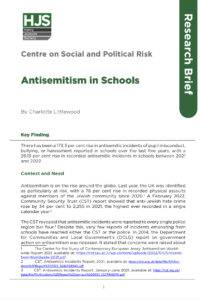 Antisemitic incidents at secondary schools have almost trebled over the past five years, according to a new report from the Henry Jackson Society.
Antisemitic incidents at secondary schools have almost trebled over the past five years, according to a new report from the Henry Jackson Society.
The findings, published today, also reveal that almost no schools have policies to combat the tide of hate.
More than 1,000 incidents have been uncovered by an unprecedented large-scale investigation using Freedom of Information requests. These included 76 instances judged so serious teachers reported them to police. There were 13 physical assaults.
The alarming report also revealed that fewer than one in 20 schools have a policy to deal with antisemitism.
FoI submissions were made to more than 3,000 secondary schools in England.
Of these, 1,315 schools — about 40 per cent — responded.
One question asked how many incidents involving pupil misconduct, bullying, harassment, or similar events in which the term “antisemitism” was recorded had taken place over the past five years.
The number of incidents reported for 2017 to 2022 totalled 1,077. There were 60 incidents in 2017. This year, the figure almost trebled to 164. A further 581 incidents were logged but not linked to a specific year within the five-year period.
Taking into account how many schools did not respond and the fact that those that did are likely to be better at dealing with antisemitism, the overall total is almost certainly far higher.
HJS found that just 47 schools have any kind of formal, written policy that might make staff more aware of the vicious forms antisemitic bullying often takes, or require them to crack down on it. The figure represents a derisory 3.4 per cent of schools that reported back.
Some of the schools in the survey shared details of individual cases. Of these, 58 per cent involved mockery and abuse of Jewish students through references to the Nazis and the Holocaust.
Tory MP Robert Halfon, chairman of the Commons Select Committee on Education, told the JC: “This is horrific. It’s hard to believe that in 2022, Jewish students are being subjected to antisemitism and abuse of this kind — and yet nothing seems to be being done about it.”
Mr Halfon said he would be raising the issue in the Commons, and that he plans to table an Early Day Motion.
Urging the Education Secretary “to introduce severe sanctions against schools who fail to deal with it”, he said: “It isn’t just a matter of education and training but culture, and he has to create the conditions where Jewish students feel safe in their schools. In the worst-affected schools, the Secretary of State should be calling head teachers individually and demanding to know what they are going to do about it.”
Bridget Phillipson, Labour’s Shadow Secretary of State for Education, told the JC: “Antisemitism is an evil that must be tackled at every level and in every part of our society. This survey has left me shocked and appalled, and the number of incidents is rising quickly.
“It’s crucial that the government acts fast to ensure that anti-racism policies are accompanied with clear guidance for teachers and school leaders on recognising antisemitism at school — in the playground and the corridor, as well as in the classroom — and on dealing with it.”
The HJS report said: “The high number of incidents reported at certain schools compared to zero incidents reported at others points towards a lack of a standardised reporting approach. A standardised approach is likely to see a much greater number of incidences reported.”
The report urges schools to adopt the International Holocaust Remembrance Association (IHRA) definition of antisemitism, which has already been endorsed by all mainstream political parties and numerous public bodies. It says that this will also help to raise awareness and improve the accuracy of incident recording.
The report highlights that “incidences of antisemitism have been on a steep incline unchecked” yet “never been shared with a public body for monitoring purposes”.
The authors suggest that as well as making antisemitism policies mandatory, the Government should ensure official education watchdog Ofsted assess antisemitism in inspections, and “require all schools to report the number of incidences of antisemitism (as outlined in the IHRA definition) to the Department of Education annually” for it to publish annual figures.
The figures for 2020–21 were more than double the previous year, up from 59 to 127. There was a further rise of almost a third in the year up until now, to 164.
The steep rise may be linked to the May 2021 conflict between Israel and Hamas, the report suggests. The overall increase in the annual totals since 2017 is 173 per cent.
One school in London catalogued 29 incidents – the most of any school. The next 10 schools for the highest figures are in Hampshire, Essex, Bristol, West Sussex, Kent, Norfolk, Cornwall, Manchester, Berkshire and Surrey. In all, 290 schools that responded to the survey recorded at least one antisemitic incident.
READ THE REPORT HERE
In the words of the author:
‘With such alarming trends in rising antisemitism juxtaposed against such a low number of schools having targeted policy to deal with it, the UK government must take heed and ensure that schools have a policy in place that ensures an understanding of and means by which antisemitism is tackled. Case descriptions, when given, nearly entirely concerned incidences relating to the Holocaust and Nazism, this alongside inconsistent reporting, causes me to fear that this is just the tip of the iceburg and that an understanding amongst staff of modern manifestations of antisemitism and the real risk the Jewish minority face is dangerously lacking.’
Charlotte Littlewood, Associate Research Fellow at the Henry Jackson Society


